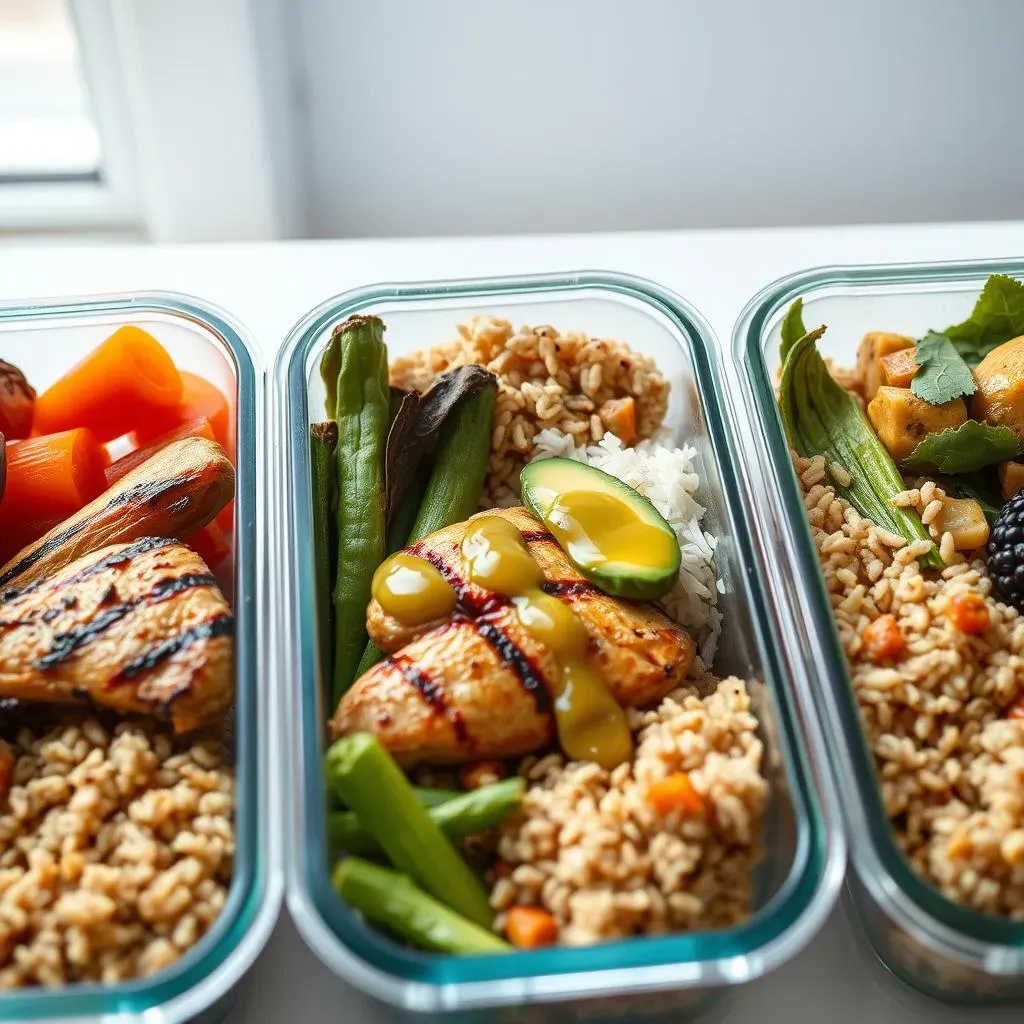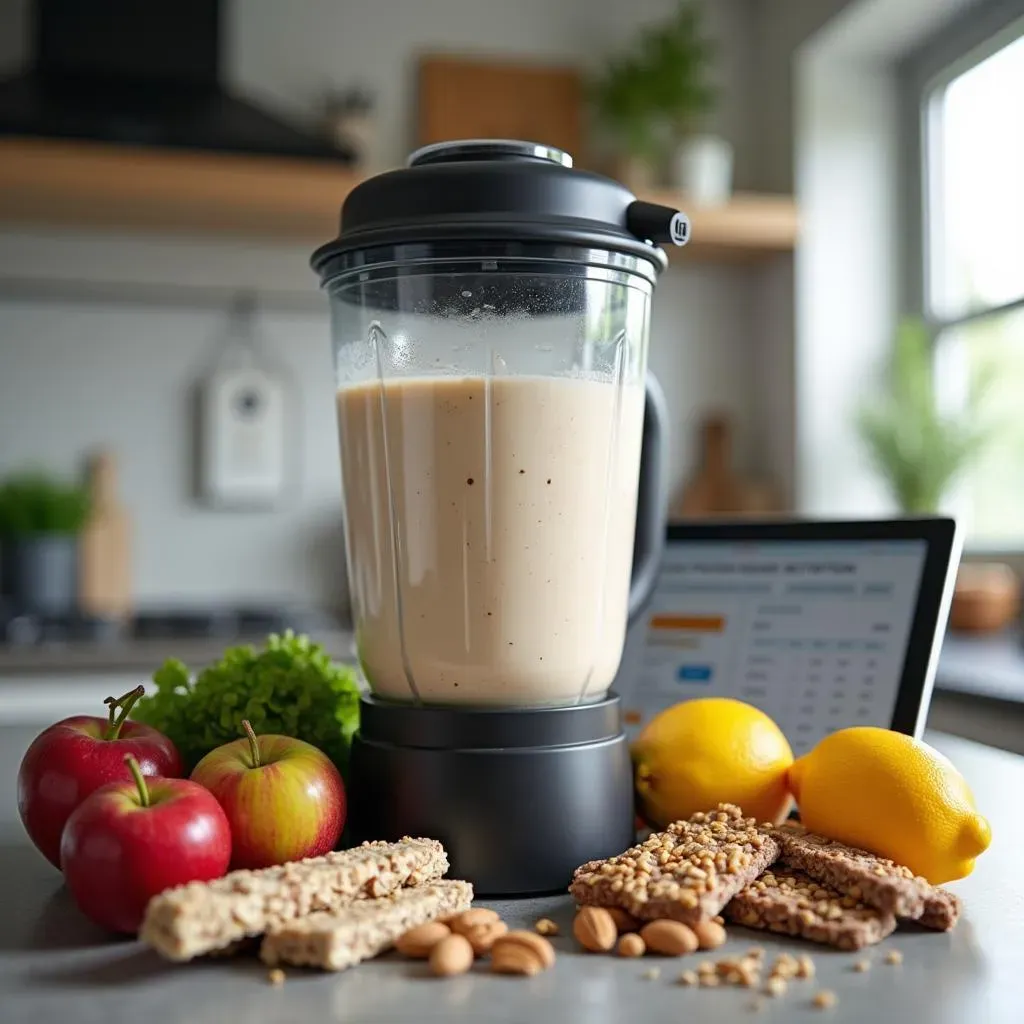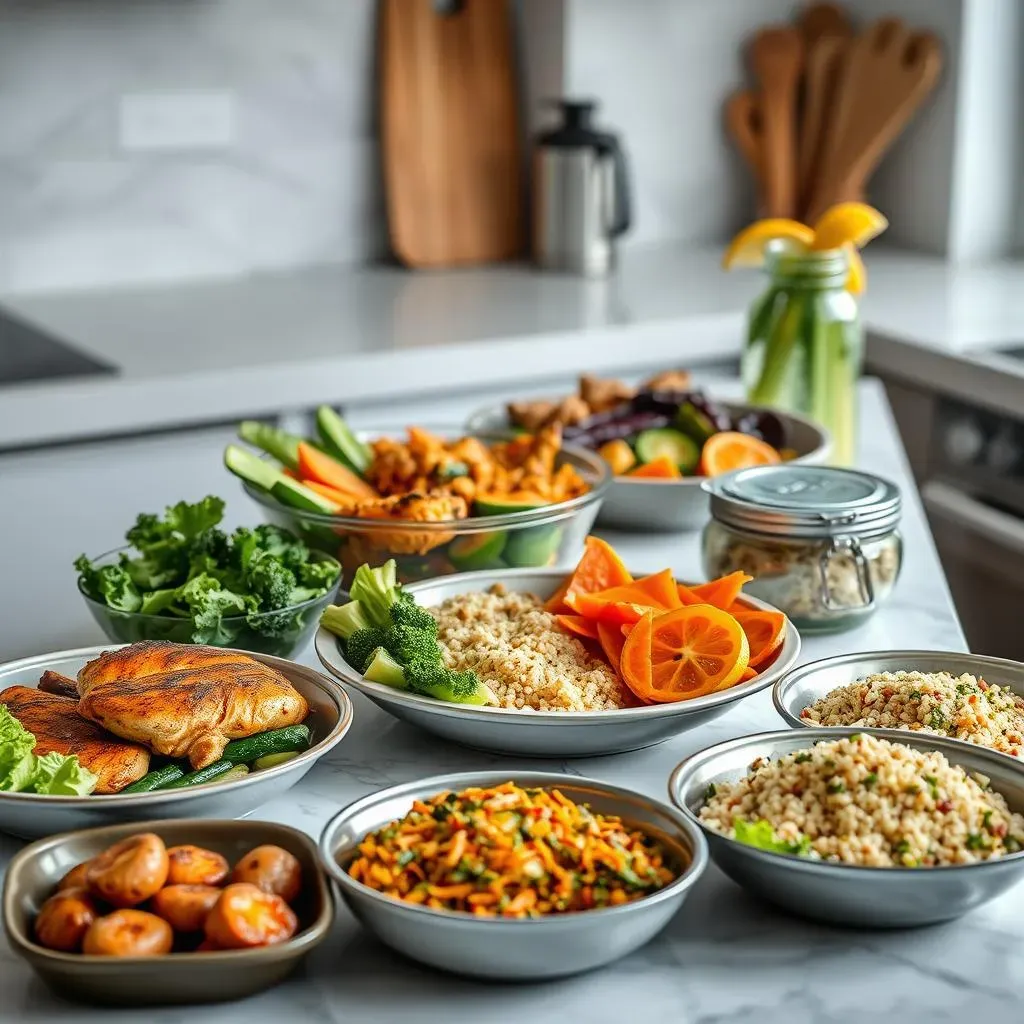Table of Contents
Ready to build serious muscle? Forget the boring chicken and broccoli routine! This article is your ultimate guide to discovering delicious and effective healthy meal prep ideas for muscle gain. We're not just talking about eating; we're talking about strategically fueling your body for optimal growth. Inside, you'll learn how to plan your meals like a pro, selecting the right protein sources to build those muscle fibers. We'll also explore the importance of carbohydrates – the energy powerhouses that fuel your intense workouts and aid in recovery. Don't worry about bland, tasteless meals; we'll share exciting recipe ideas and sample meal plans to keep you motivated and satisfied. Get ready to transform your physique with our simple, yet highly effective, healthy meal prep strategies. Let's dive in and build the body you've always wanted!
Healthy Meal Prep Ideas for Muscle Gain: Planning Your Attack

Healthy Meal Prep Ideas for Muscle Gain: Planning Your Attack
Setting Your Goals: Defining Your Muscle-Building Journey
Before you even think about chopping veggies, you need a plan. What are your muscle-building goals? Are you aiming for overall strength, increased size, or improved endurance? Knowing your objectives is crucial for tailoring your meal prep strategy. Think of it like building a house: you wouldn't start laying bricks without blueprints, would you? Similarly, defining your fitness goals helps you determine the appropriate calorie intake, macronutrient ratios (protein, carbs, and fats), and the types of foods you'll need to include in your meal prep.
Consider factors like your current weight, activity level, and training schedule. Are you a beginner or a seasoned lifter? This influences the intensity and volume of your training, which in turn affects your nutritional needs. Don't be afraid to seek guidance from a fitness professional or registered dietitian to help you set realistic and achievable goals.
Goal | Considerations |
|---|---|
Increase Strength | Higher calorie intake, balanced macronutrients, focus on complex carbs |
Increase Muscle Size (Hypertrophy) | High protein intake, sufficient calorie surplus, adequate carbs for energy |
Improve Endurance | Balanced macronutrients, emphasis on complex carbs for sustained energy |
Mastering the Macronutrients: The Building Blocks of Muscle
Now that you have your goals, let's talk macronutrients. Protein is the king for muscle growth, acting as the building blocks for your muscles. Aim for a high protein intake, ideally around 1 gram per pound of body weight. Carbs are your energy source, fueling your workouts and keeping you feeling full. Opt for complex carbs like brown rice, quinoa, and sweet potatoes over refined sugars. Healthy fats are essential for hormone production and overall health; include sources like avocados, nuts, and olive oil in moderation.
Tracking your macronutrients can be incredibly helpful, especially in the beginning. There are many apps and websites that can help you calculate your daily needs and track your intake. Don't stress about being perfect; consistency is key. Start by making small, manageable changes to your diet, gradually increasing your protein and complex carbs while reducing refined sugars and unhealthy fats. The goal is to create a sustainable eating pattern that supports your muscle-building journey.
- Protein Sources: Chicken breast, fish, lean beef, eggs, Greek yogurt, lentils, tofu
- Carb Sources: Brown rice, quinoa, sweet potatoes, oats, whole-wheat bread
- Healthy Fats: Avocados, nuts, seeds, olive oil
Crafting Your Meal Prep Strategy: A Step-by-Step Guide
Once you've determined your goals and macronutrient targets, it's time to plan your meals. Start by choosing recipes that align with your preferences and dietary needs. Consider factors like cooking time, ingredients, and nutritional value. Batch cooking is your best friend; prepare large quantities of protein and sides at the beginning of the week, storing them in airtight containers for easy access throughout the week. This saves time and prevents you from making impulsive unhealthy food choices when you're short on time.
Think about your schedule and when you'll have time to prep your meals. Sunday afternoons are a popular choice, but find what works best for you. Pre-portioning your meals into individual containers makes it incredibly convenient to grab and go. This eliminates the guesswork and prevents overeating. Remember, consistency is more important than perfection. Even small improvements to your meal prep can significantly impact your muscle growth and overall health.
Protein Powerhouses: Building Blocks for Muscle Growth

Protein Powerhouses: Building Blocks for Muscle Growth
Understanding Protein's Role in Muscle Growth
Think of protein as the LEGO bricks of your muscles. Your body breaks down protein into amino acids, the tiny building blocks it uses to repair and rebuild muscle tissue after your workouts. Without sufficient protein, your muscles simply won't grow. It's that simple. Imagine trying to build a magnificent LEGO castle with only half the bricks you need – it's just not going to happen. Similarly, insufficient protein intake limits your muscle-building potential, no matter how hard you train.
The amount of protein you need depends on several factors, including your weight, activity level, and training goals. As a general guideline, aiming for around 1 gram of protein per pound of body weight is a good starting point. However, some individuals may benefit from consuming even more, especially those engaging in intense strength training. Don't be afraid to experiment and find what works best for your body. Listen to your body, and adjust your protein intake accordingly.
Protein Source | Grams of Protein per Serving (approx.) |
|---|---|
Chicken Breast (4oz) | 30g |
Salmon (4oz) | 25g |
Greek Yogurt (1 cup) | 20g |
Lentils (1 cup cooked) | 18g |
Choosing the Right Protein Sources: Variety is Key
Now, let's talk about the *types* of protein. While all protein sources contribute to muscle growth, some are better absorbed and utilized by your body than others. Aim for a variety of protein sources to ensure you're getting a complete amino acid profile. Think of it like a balanced diet for your muscles – they need a mix of nutrients to thrive.
Include a mix of animal and plant-based protein sources in your meal prep. Animal proteins like chicken, fish, beef, and eggs are considered complete proteins, meaning they contain all nine essential amino acids your body can't produce on its own. Plant-based options like lentils, beans, tofu, and quinoa are also excellent sources of protein, although they may not contain all nine essential amino acids in the same proportions. Combining different plant-based proteins throughout the day can help you achieve a complete amino acid profile.
- Lean Meats: Chicken breast, turkey breast, lean beef, fish (salmon, tuna, cod)
- Dairy: Greek yogurt, cottage cheese, milk (choose low-fat or skim)
- Legumes: Lentils, chickpeas, black beans, kidney beans
- Plant-based Protein Sources: Tofu, tempeh, edamame, quinoa, chia seeds
Carb Choices: Fueling Your Workouts and Recovery

Carb Choices: Fueling Your Workouts and Recovery
Understanding Carbs' Crucial Role in Muscle Growth
Okay, so we've talked protein – the muscle builder. Now let's talk about carbs – the muscle *fuel*. Think of carbs as the high-octane gasoline that powers your workouts. Without sufficient carbs, your energy levels will plummet, hindering your ability to lift heavy, push hard, and ultimately build muscle. Your body needs carbs to convert into glucose, the primary energy source for your muscles. Depriving your muscles of glucose is like trying to drive a race car on empty – it's not going to end well.
The type of carbs you choose matters just as much as the amount. Focus on complex carbohydrates, which are digested more slowly and provide sustained energy throughout your workout and recovery period. These carbs are packed with fiber and other essential nutrients, unlike simple carbs that cause a quick spike in blood sugar followed by a crash. Simple carbs include sugary drinks, white bread, and pastries. Complex carbs are found in foods like brown rice, sweet potatoes, quinoa, and oats. The right carb choices provide sustained energy without the energy roller coaster.
Carb Type | Examples | Benefits |
|---|---|---|
Complex Carbs | Brown rice, quinoa, sweet potatoes, oats | Sustained energy, fiber, nutrients |
Simple Carbs | White bread, sugary drinks, candy | Quick energy spike, followed by crash |
Timing Your Carb Intake: Maximizing Muscle Growth
Timing your carb intake strategically can significantly impact your muscle growth. Consuming carbs before your workout provides your muscles with readily available energy, allowing you to push harder and lift heavier. Think of it like pre-fueling your car before a long road trip. After your workout, carbs help replenish glycogen stores in your muscles, aiding in muscle recovery and growth. This is crucial for preventing muscle breakdown and promoting muscle protein synthesis, which is the process of building new muscle tissue.
It's not just about the *when*, but also the *how much*. The amount of carbs you need will depend on your training intensity and duration. Heavier training sessions will require more carbs to fuel your muscles. Pay attention to how your body feels. If you're feeling sluggish or experiencing low energy during your workouts, you may need to increase your carb intake. Conversely, if you're experiencing weight gain, you might need to adjust your carb intake downward. It's a balancing act, finding the sweet spot that fuels your workouts and supports muscle growth without leading to unwanted fat storage.
- Pre-workout: Consume complex carbs 1-2 hours before training
- Post-workout: Consume a mix of carbs and protein within 30-60 minutes of finishing your workout
- Throughout the day: Spread your carb intake evenly throughout the day to maintain consistent energy levels
Carb Sources for Muscle Gain: Delicious and Effective Options
Now, let's get down to the delicious part – choosing your carb sources! The good news is there are plenty of tasty and nutritious options to fuel your muscle-building journey. Don't limit yourself to boring, bland carbs. Explore different types of complex carbs to keep your meals exciting and satisfying. Experiment with different grains, fruits, and vegetables to find what you enjoy and what works best for your body.
Remember, it's all about balance. While complex carbs are your primary focus, incorporating small amounts of simple carbs occasionally won't derail your progress. Think of it as a treat, not a staple. A small serving of fruit after your workout, for example, can provide a quick boost of energy and help with replenishing glycogen stores. The key is moderation and mindful consumption. Focus on whole, unprocessed carbs whenever possible, and avoid sugary drinks and processed snacks.
Healthy Meal Prep Ideas for Muscle Gain: Sample Meal Plans & Recipes

Healthy Meal Prep Ideas for Muscle Gain: Sample Meal Plans & Recipes
Sample Meal Plan 1: The Beginner's Blueprint
This meal plan is perfect for those just starting their muscle-building journey. It focuses on simple, easy-to-prepare meals that are packed with protein and complex carbohydrates. Remember, consistency is key, so choose recipes you genuinely enjoy. Don't be afraid to swap out ingredients based on your preferences and dietary needs. The goal is to create a sustainable eating pattern that you can maintain over the long term.
This plan provides roughly 1800-2000 calories, with a macronutrient ratio of approximately 40% carbohydrates, 30% protein, and 30% fat. Adjust the portion sizes based on your individual needs and activity level. Remember to stay hydrated by drinking plenty of water throughout the day. Listen to your body and adjust the plan as needed. Consistency is more important than perfection.
Meal | Recipe Idea |
|---|---|
Breakfast | Oatmeal with berries and nuts, Greek yogurt with granola |
Lunch | Chicken salad sandwich on whole-wheat bread, large salad with grilled chicken or chickpeas |
Dinner | Baked salmon with roasted vegetables, lean ground beef stir-fry with brown rice |
Snacks | Hard-boiled eggs, fruit, protein shake, trail mix |
Sample Meal Plan 2: The Intermediate Powerhouse
This meal plan is designed for those who have been consistently training and are looking to take their muscle gains to the next level. It incorporates more complex recipes and a higher calorie intake. Focus on incorporating a variety of protein sources, complex carbohydrates, and healthy fats. Don't be afraid to experiment with different flavors and cooking techniques to keep your meals interesting. Remember, meal prepping is an ongoing process of learning and adaptation. Find what works best for your body and your lifestyle.
This plan provides approximately 2200-2500 calories, with a macronutrient ratio of approximately 45% carbohydrates, 35% protein, and 20% fat. This is just a guideline; adjust portion sizes based on your individual needs and training intensity. Remember, proper hydration is crucial for optimal muscle growth and recovery. Pay attention to how your body responds to the plan and make adjustments as needed. Consistency and patience are key to achieving your fitness goals.
- Breakfast: Protein pancakes with berries and a side of scrambled eggs
- Lunch: Chicken breast with quinoa and roasted broccoli, lentil soup with whole-wheat bread
- Dinner: Lean beef stir-fry with brown rice and mixed vegetables, baked chicken with sweet potato and green beans
- Snacks: Greek yogurt with fruit and nuts, protein bar, hard-boiled eggs
Recipe Spotlight: Chicken and Sweet Potato Hash
This recipe is a simple, yet highly effective, way to incorporate both protein and complex carbohydrates into your diet. It's easy to prepare in large batches and can be stored in the refrigerator for several days. Feel free to add your own favorite spices and vegetables to customize the recipe to your liking. Experiment with different seasonings and herbs to keep your meals exciting and prevent boredom. Remember to adjust portion sizes based on your individual calorie needs.
Ingredients: 1 lb boneless, skinless chicken breast, 2 large sweet potatoes (cubed), 1 onion (chopped), 1 bell pepper (chopped), olive oil, salt, pepper, your favorite spices. Instructions: Preheat oven to 400°F (200°C). Toss sweet potatoes, onion, and bell pepper with olive oil, salt, pepper, and spices. Spread on a baking sheet. Bake for 20 minutes. Add chicken breast to the baking sheet. Bake for another 15-20 minutes, or until chicken is cooked through. Enjoy!